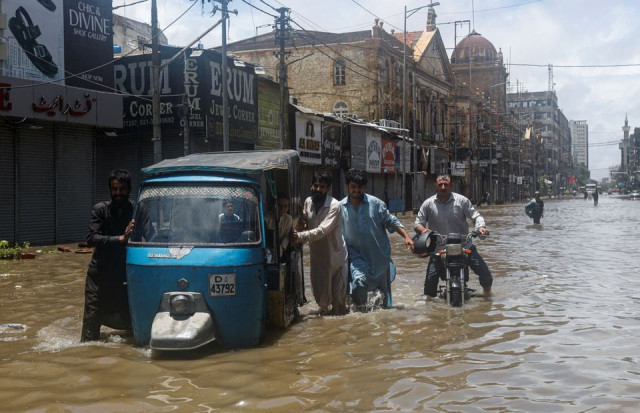Inefficient planning: Repair work on flooded roads raises eyebrows
Engineering defects, poor quality materials will result in a poor rebuild bound to get ruined by future rains

A reconstruction drive to fix the devastation to roads caused by the monsoon flooding is underway in Karachi but urban planners have raised their objections about the methods and quality of the work being done.
The booming metropolis, Karachi, has never been an infrastructural marvel; however, city planners feel that if an opportunity has arisen to fix engineering defects it should be cashed in properly rather than making short-term fixes. Muhammad Toheed, an urban planner based in the city, was of the view that roads across the city were destroyed completely due to the use of poor construction materials and bad engineering. “In this rebuilding phase, none of those concerns have been addressed. Therefore, there is a high probability that these roads will deteriorate again even with a little rain or sewage water,” Toheed predicted, adding that the public money spent would be wasted.
Toheed based his prediction on the fact that the Karachi Metropolitan Corporation (KMC), which is responsible for the repairs, is not doing the rebuilding work itself but rather through third parties. “These construction companies are always looking to cut their costs, so the quality of the roads will be substandard.”
The construction of roads is not just about laying tar, engineers should focus on making them durable so that sewage or rain water does not stand on the roads and ruin them, as per the urban planner. “It is important that both sides of the roads are sloped at the time of carpeting so that rain or sewage water immediately flows into the rain drains located on both sides,” Toheed suggested.
Sikander Baloch, the Spokesperson of the KMC Administrator, Murtaza Wahab, when asked if roads were being rebuilt keeping future floods in mind, did not give an answer and instead provided details about the reconstruction projects underway. “The construction of 20 important roads of the city is ongoing and the Sindh government has provided Rs 1 billion as a special grant,” Baloch informed.
On the other hand, as per Sindh government sources privy to the matter, a total of Rs 13 billion will be required to restore the entire network of damaged roads in Karachi. The Spokesperson of the Sindh Chief Minister (CM), Abdul Rasheed Channa, when asked where would such a mammoth amount be arranged from, replied: “In a meeting held under the Chairmanship of the CM, the officials of the World Bank have assured to provide Rs 6 billion and the Government of Sindh will arrange the remaining Rs 7 billion through other sources.”
Channa further informed that in the meeting the need for having a modern sewage system for the city was discussed as well. “Such a redesign of the sewage system will cost Rs 25 billion.”
Toheed believes that this amount is arrangeable if the KMC mends its ways. “There is no need to get financial assistance from the World Bank for the construction of roads and other development works in Karachi. KMC can get this amount from its own resources if it improves its efficiency in the provision of municipal services. Doing so will increase the residents’ confidence in the KMC and they will pay more in taxes,” Toheed opined while talking to The Express Tribune.
Published in The Express Tribune, October 31st, 2022.



















COMMENTS
Comments are moderated and generally will be posted if they are on-topic and not abusive.
For more information, please see our Comments FAQ